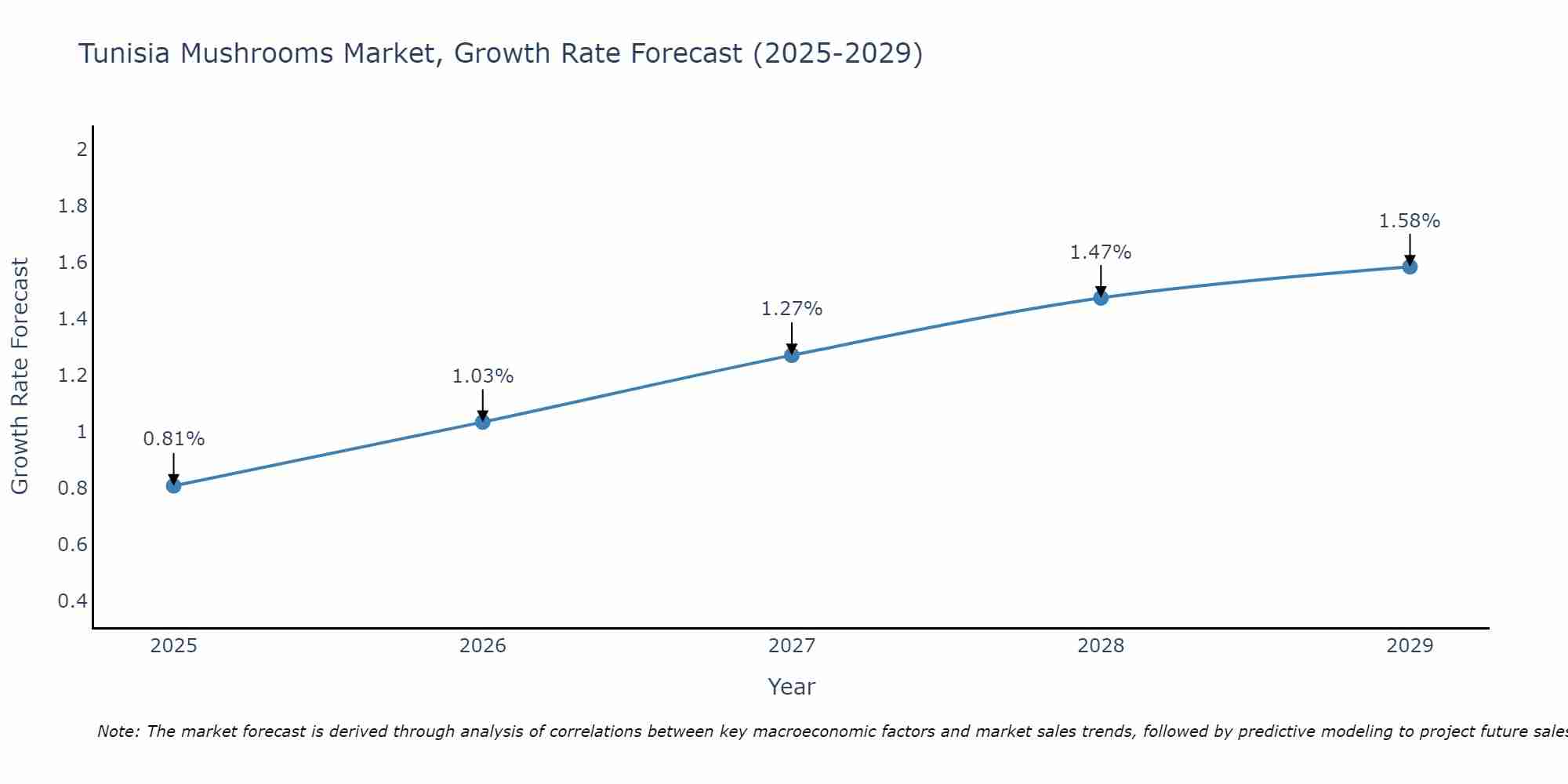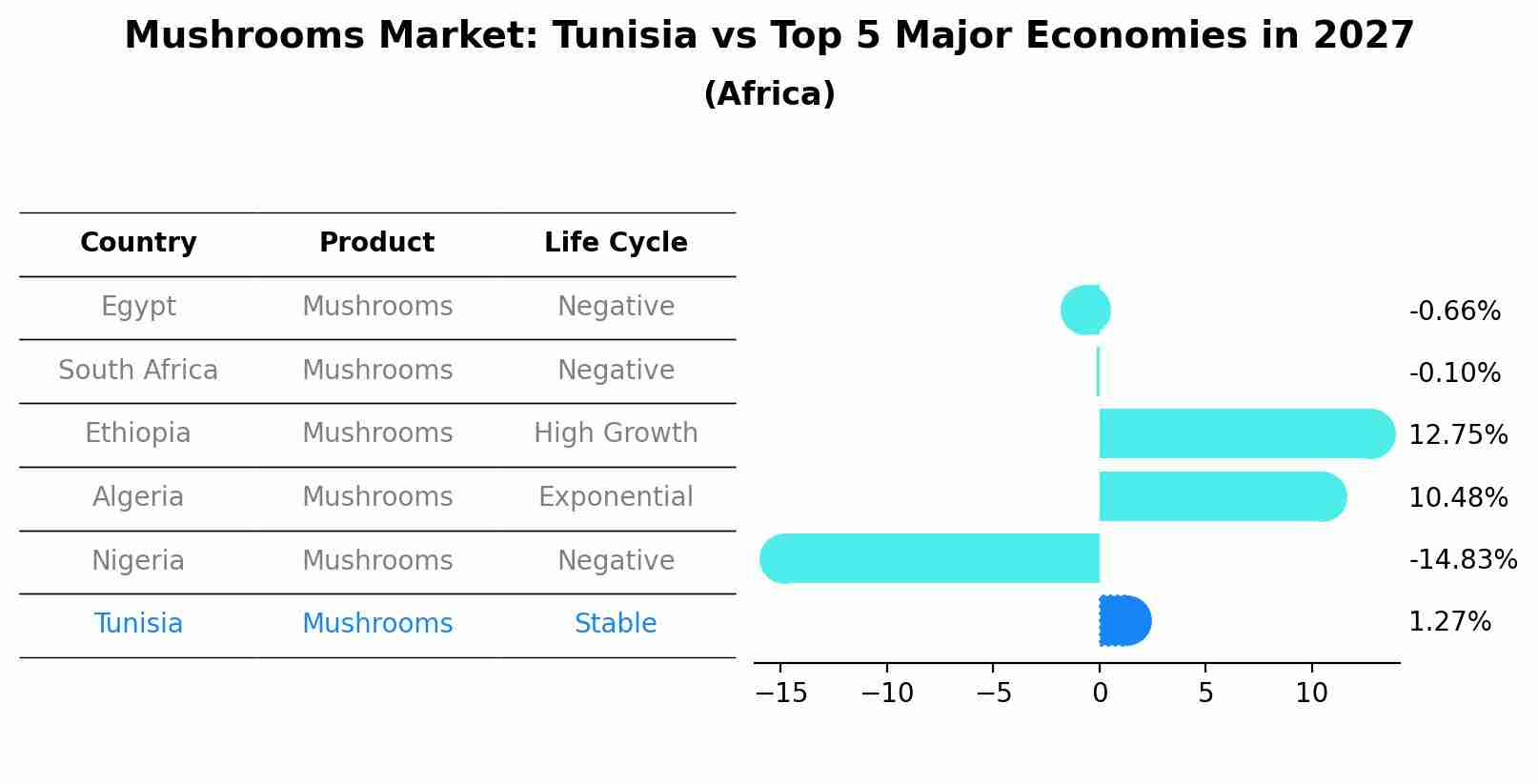Tunisia Mushrooms Market (2025-2031) Outlook | Forecast, Revenue, Industry, Value, Trends, Companies, Size, Growth, Share & Analysis
| Product Code: ETC383214 | Publication Date: Aug 2022 | Updated Date: Jul 2025 | Product Type: Market Research Report | |
| Publisher: 6Wresearch | Author: Ravi Bhandari | No. of Pages: 75 | No. of Figures: 35 | No. of Tables: 20 |
Tunisia Mushrooms Market Size Growth Rate
The Tunisia Mushrooms Market is poised for steady growth rate improvements from 2025 to 2029. From 0.81% in 2025, the growth rate steadily ascends to 1.58% in 2029.

Mushrooms Market: Tunisia vs Top 5 Major Economies in 2027 (Africa)
By 2027, the Mushrooms market in Tunisia is anticipated to reach a growth rate of 1.27%, as part of an increasingly competitive Africa region, where Egypt remains at the forefront, supported by South Africa, Ethiopia, Algeria and Nigeria, driving innovations and market adoption across sectors.

Tunisia Mushrooms Market Synopsis
The Tunisia mushrooms market is experiencing steady growth due to increasing consumer awareness of the health benefits associated with mushroom consumption. The market is primarily driven by factors such as rising demand for organic and natural products, as well as the growing popularity of plant-based diets. Tunisian consumers are showing a preference for fresh and locally sourced mushrooms, which has led to an expansion in mushroom cultivation in the region. Key players in the market are focusing on product innovation and diversification to cater to changing consumer preferences. Additionally, the government`s support for agricultural development and initiatives to boost mushroom production are expected to further fuel market growth in Tunisia. Overall, the Tunisia mushrooms market presents opportunities for both local producers and international companies looking to enter the market.
Tunisia Mushrooms Market Trends
The Tunisia mushrooms market is experiencing a growing trend towards organic and locally sourced products as consumers are becoming more health-conscious and environmentally aware. There is an increasing demand for exotic mushroom varieties such as shiitake, oyster, and enoki, as they are perceived as gourmet and offer unique flavors and textures. The market is also witnessing a rise in the popularity of dried and powdered mushrooms due to their longer shelf life and convenience. With the growing interest in plant-based diets, mushrooms are being recognized for their nutritional benefits and versatility in vegetarian and vegan cooking. Additionally, technological advancements in cultivation techniques are improving efficiency and quality in the Tunisian mushroom industry, leading to a more diverse and accessible market for consumers.
Tunisia Mushrooms Market Challenges
In the Tunisia mushrooms market, several challenges are faced, including limited consumer awareness and acceptance of mushrooms as a staple food item, leading to relatively low consumption rates compared to more traditional food sources. Additionally, infrastructure constraints such as inadequate transportation and storage facilities hinder the distribution and availability of fresh mushrooms, impacting market growth. The lack of standardized quality control measures and certifications also poses a challenge in ensuring product quality and safety for consumers. Furthermore, fluctuations in weather conditions and environmental factors affect mushroom cultivation, leading to inconsistent supply levels and pricing. Addressing these challenges through targeted consumer education, investment in infrastructure development, and implementing quality control standards will be crucial in driving the growth of the Tunisia mushrooms market.
Tunisia Mushrooms Market Investment Opportunities
Investment opportunities in the Tunisia mushrooms market are promising due to growing consumer demand for healthy and organic food products. With Tunisia`s favorable climate for mushroom cultivation, investors can consider opportunities in establishing mushroom farms or investing in existing farms to increase production capacity. Additionally, there is potential for value-added products such as dried mushrooms, mushroom supplements, and mushroom-based snacks to cater to diverse consumer preferences. Collaborating with local farmers and producers to enhance the supply chain efficiency and quality of mushrooms can also be a viable investment option. Overall, the Tunisia mushrooms market presents opportunities for investors to capitalize on the increasing popularity of mushrooms as a nutritious and versatile food choice in the region.
Jordan Agar Market Government Policies
In Tunisia, the government has implemented policies to support the growth of the mushroom market. The Ministry of Agriculture has provided subsidies and technical assistance to mushroom farmers to boost production and quality standards. Additionally, the government has initiated programs to promote research and development in the mushroom industry, aiming to enhance innovation and competitiveness. Importantly, regulations have been put in place to ensure food safety and quality control in mushroom production. These policies reflect the government`s commitment to developing the mushroom sector as a key player in the country`s agricultural economy, with a focus on sustainability and meeting consumer demand for high-quality mushrooms.
Tunisia Mushrooms Market Future Outlook
The Tunisia mushrooms market is poised for steady growth in the coming years, driven by increasing consumer awareness of the health benefits associated with mushrooms, such as their high nutritional value and potential medicinal properties. Additionally, the growing trend towards plant-based diets and a rising demand for organic and locally sourced produce are expected to boost the market further. Improved distribution channels and advancements in cultivation techniques are likely to enhance the availability of a diverse range of mushroom varieties in the market. Furthermore, government initiatives to promote agricultural sustainability and support local farmers could also contribute to the market`s expansion. Overall, the Tunisia mushrooms market is anticipated to experience promising growth opportunities in the foreseeable future.
Key Highlights of the Report:
- Tunisia Mushrooms Market Outlook
- Market Size of Tunisia Mushrooms Market, 2024
- Forecast of Tunisia Mushrooms Market, 2031
- Historical Data and Forecast of Tunisia Mushrooms Revenues & Volume for the Period 2021 - 2031
- Tunisia Mushrooms Market Trend Evolution
- Tunisia Mushrooms Market Drivers and Challenges
- Tunisia Mushrooms Price Trends
- Tunisia Mushrooms Porter's Five Forces
- Tunisia Mushrooms Industry Life Cycle
- Historical Data and Forecast of Tunisia Mushrooms Market Revenues & Volume By Product for the Period 2021 - 2031
- Historical Data and Forecast of Tunisia Mushrooms Market Revenues & Volume By Button for the Period 2021 - 2031
- Historical Data and Forecast of Tunisia Mushrooms Market Revenues & Volume By Shiitake for the Period 2021 - 2031
- Historical Data and Forecast of Tunisia Mushrooms Market Revenues & Volume By Oyster for the Period 2021 - 2031
- Historical Data and Forecast of Tunisia Mushrooms Market Revenues & Volume By Matsutake for the Period 2021 - 2031
- Historical Data and Forecast of Tunisia Mushrooms Market Revenues & Volume By Truffles for the Period 2021 - 2031
- Historical Data and Forecast of Tunisia Mushrooms Market Revenues & Volume By Other for the Period 2021 - 2031
- Historical Data and Forecast of Tunisia Mushrooms Market Revenues & Volume By Form for the Period 2021 - 2031
- Historical Data and Forecast of Tunisia Mushrooms Market Revenues & Volume By Fresh for the Period 2021 - 2031
- Historical Data and Forecast of Tunisia Mushrooms Market Revenues & Volume By Processed for the Period 2021 - 2031
- Historical Data and Forecast of Tunisia Mushrooms Market Revenues & Volume By Distribution Channel for the Period 2021 - 2031
- Historical Data and Forecast of Tunisia Mushrooms Market Revenues & Volume By Direct to Customer for the Period 2021 - 2031
- Historical Data and Forecast of Tunisia Mushrooms Market Revenues & Volume By Grocery Stores for the Period 2021 - 2031
- Historical Data and Forecast of Tunisia Mushrooms Market Revenues & Volume By Supermarkets & Hypermarkets for the Period 2021 - 2031
- Historical Data and Forecast of Tunisia Mushrooms Market Revenues & Volume By Convenience Stores for the Period 2021 - 2031
- Historical Data and Forecast of Tunisia Mushrooms Market Revenues & Volume By Online Stores for the Period 2021 - 2031
- Historical Data and Forecast of Tunisia Mushrooms Market Revenues & Volume By Application for the Period 2021 - 2031
- Historical Data and Forecast of Tunisia Mushrooms Market Revenues & Volume By Food for the Period 2021 - 2031
- Historical Data and Forecast of Tunisia Mushrooms Market Revenues & Volume By Pharmaceutical for the Period 2021 - 2031
- Historical Data and Forecast of Tunisia Mushrooms Market Revenues & Volume By Cosmetics for the Period 2021 - 2031
- Tunisia Mushrooms Import Export Trade Statistics
- Market Opportunity Assessment By Product
- Market Opportunity Assessment By Form
- Market Opportunity Assessment By Distribution Channel
- Market Opportunity Assessment By Application
- Tunisia Mushrooms Top Companies Market Share
- Tunisia Mushrooms Competitive Benchmarking By Technical and Operational Parameters
- Tunisia Mushrooms Company Profiles
- Tunisia Mushrooms Key Strategic Recommendations
Frequently Asked Questions About the Market Study (FAQs):
- Single User License$ 1,995
- Department License$ 2,400
- Site License$ 3,120
- Global License$ 3,795
Search
Thought Leadership and Analyst Meet
Our Clients
Related Reports
- Afghanistan Rocking Chairs And Adirondack Chairs Market (2026-2032) | Size & Revenue, Competitive Landscape, Share, Segmentation, Industry, Value, Outlook, Analysis, Trends, Growth, Forecast, Companies
- Afghanistan Apparel Market (2026-2032) | Growth, Outlook, Industry, Segmentation, Forecast, Size, Companies, Trends, Value, Share, Analysis & Revenue
- Canada Oil and Gas Market (2026-2032) | Share, Segmentation, Value, Industry, Trends, Forecast, Analysis, Size & Revenue, Growth, Competitive Landscape, Outlook, Companies
- Germany Breakfast Food Market (2026-2032) | Industry, Share, Growth, Size, Companies, Value, Analysis, Revenue, Trends, Forecast & Outlook
- Australia Briquette Market (2025-2031) | Growth, Size, Revenue, Forecast, Analysis, Trends, Value, Share, Industry & Companies
- Vietnam System Integrator Market (2025-2031) | Size, Companies, Analysis, Industry, Value, Forecast, Growth, Trends, Revenue & Share
- ASEAN and Thailand Brain Health Supplements Market (2025-2031) | Strategy, Consumer Insights, Analysis, Investment Trends, Opportunities, Growth, Size, Share, Industry, Revenue, Segments, Value, Segmentation, Supply, Forecast, Restraints, Outlook, Competition, Drivers, Trends, Demand, Pricing Analysis, Competitive, Strategic Insights, Companies, Challenges
- ASEAN Bearings Market (2025-2031) | Strategy, Consumer Insights, Analysis, Investment Trends, Opportunities, Growth, Size, Share, Industry, Revenue, Segments, Value, Segmentation, Supply, Forecast, Restraints, Outlook, Competition, Drivers, Trends, Demand, Pricing Analysis, Competitive, Strategic Insights, Companies, Challenges
- Europe Flooring Market (2025-2031) | Outlook, Share, Industry, Trends, Forecast, Companies, Revenue, Size, Analysis, Growth & Value
- Saudi Arabia Manlift Market (2025-2031) | Outlook, Size, Growth, Trends, Companies, Industry, Revenue, Value, Share, Forecast & Analysis
Industry Events and Analyst Meet
Whitepaper
- Middle East & Africa Commercial Security Market Click here to view more.
- Middle East & Africa Fire Safety Systems & Equipment Market Click here to view more.
- GCC Drone Market Click here to view more.
- Middle East Lighting Fixture Market Click here to view more.
- GCC Physical & Perimeter Security Market Click here to view more.
6WResearch In News
- Doha a strategic location for EV manufacturing hub: IPA Qatar
- Demand for luxury TVs surging in the GCC, says Samsung
- Empowering Growth: The Thriving Journey of Bangladesh’s Cable Industry
- Demand for luxury TVs surging in the GCC, says Samsung
- Video call with a traditional healer? Once unthinkable, it’s now common in South Africa
- Intelligent Buildings To Smooth GCC’s Path To Net Zero


















